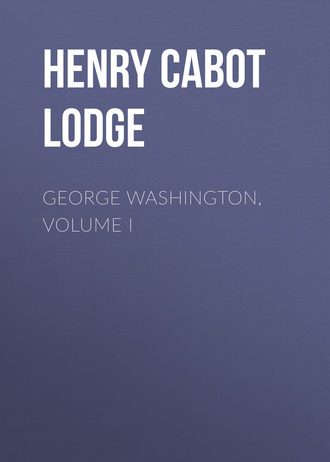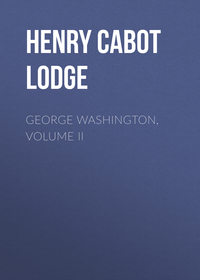 полная версия
полная версияGeorge Washington, Volume I
When Washington drew his sword beneath the Cambridge elm he stood forth as the first American, the best type of man that the New World could produce, with no provincial taint upon him, and no shadow of the colonial past clouding his path. It was this great quality that gave the struggle which he led a character it would never have attained without a leader so constituted. Had he been merely a colonial Englishman, had he not risen at once to the conception of an American nation, the world would have looked at us with very different eyes. It was the personal dignity of the man, quite as much as his fighting capacity, which impressed Europe. Kings and ministers, looking on dispassionately, soon realized that here was no ordinary agitator or revolutionist, but a great man on a great stage with great conceptions. England, indeed, talked about a militia colonel, but this chatter disappeared in the smoke of Trenton, and even England came to look upon him as the all-powerful spirit of the Revolution. Dull men and colonial squires do not grasp a great idea and carry it into action on the world's stage in a few months. To stand forward at the head of raw armies and of a colonial people as a national leader, calm, dignified, and far-seeing, requires not only character, but intellect of the highest and strongest kind. Now that we have come as a people, after more than a century's struggle, to the national feeling which Washington compassed in a moment, it is well to consider that single achievement and to meditate on its meaning, whether in estimating him, or in gauging what he was to the American people when they came into existence.
Let us take another instance of the same quality, shown also in the winter of 1778. Congress had from the beginning a longing to conquer Canada, which was a wholly natural and entirely laudable desire, for conquest is always more interesting than defense. Washington, on the other hand, after the first complete failure, which was so nearly a success in the then undefended and unsuspicious country, gave up pretty thoroughly all ideas of attacking Canada again, and opposed the various plans of Congress in that direction. When he had a life-and-death struggle to get together and subsist enough men to protect their own firesides, he had ample reason to know that invasions of Canada were hopeless. Indeed, not much active opposition from the commander-in-chief was needed to dispose of the Canadian schemes, for facts settled them as fast as they arose. When the cabal got up its Canadian expedition, it consisted of Lafayette, and penetrated no farther than Albany. So Washington merely kept his eye watchfully on Canada, and argued against expeditions thither, until this winter of 1778, when something quite new in that direction came up.
Lafayette's imagination had been fired by the notion of conquering Canada. His idea was to get succors from France for this especial purpose, and with them and American aid to achieve the conquest. Congress was impressed and pleased by the scheme, and sent a report upon it to Franklin, to communicate to the French court, but Washington, when he heard of the plan, took a very different view. He sent at once a long dispatch to Congress, urging every possible objection to the proposed campaign, on the ground of its utter impracticability, and with this official letter, which was necessarily confined to the military side of the question, went another addressed to President Laurens personally, which contained the deeper reasons of his opposition. He said that there was an objection not touched upon in his public letter, which was absolutely insurmountable. This was the introduction of French troops into Canada to take possession of the capital, in the midst of a people of their own race and religion, and but recently severed from them.
He pointed out the enormous advantages which would accrue to France from the possession of Canada, such as independent posts, control of the Indians, and the Newfoundland trade. "France, … possessed of New Orleans on our right, Canada on our left, and seconded by the numerous tribes of Indians in our rear, … would, it is much to be apprehended, have it in her power to give law to these States." He went on to show that France might easily find an excuse for such conduct, in seeking a surety for her advances of money, and that she had but little to fear from the contingency of our being driven to reunite with England. He continued: "Men are very apt to run into extremes. Hatred to England may carry some into an excess of confidence in France, especially when motives of gratitude are thrown into the scale. Men of this description would be unwilling to suppose France capable of acting so ungenerous a part. I am heartily disposed to entertain the most favorable sentiments of our new ally, and to cherish them in others to a reasonable degree. But it is a maxim, founded on the universal experience of mankind, that no nation is to be trusted farther than it is bound by its own interest; and no prudent statesman or politician will venture to depart from it. In our circumstances we ought to be particularly cautious; for we have not yet attained sufficient vigor and maturity to recover from the shock of any false steps into which we may unwarily fall."
We shall have occasion to recall these utterances at a later day, but at this time they serve to show yet again how broadly and clearly Washington judged nations and policies. Uppermost in his mind was the destiny of his own nation, just coming into being, and from that firm point he watched and reasoned. His words had no effect on Congress, but as it turned out, the plan failed through adverse influences in the quarter where Washington least expected them. He believed that this Canadian plan had been put into Lafayette's mind by the cabinet of Louis XVI., and he could not imagine that a policy of such obvious wisdom could be overlooked by French statesmen. In this he was completely mistaken, for France failed to see what seemed so simple to the American general, that the opportunity had come to revive her old American policy and reestablish her colonies under the most favorable conditions. The ministers of Louis XVI., moreover, did not wish the colonies to conquer Canada, and the plan of Lafayette and the Congress received no aid in Paris and came to nothing. But the fruitless incident exhibits in the strongest light the attitude of Washington as a purely American statesman, and the comprehensiveness of his mind in dealing with large affairs.
The French alliance and the coming of the French fleet were of incalculable advantage to the colonies, but they had one evil effect, as has already been suggested. To a people weary with unequal conflict, it was a debilitating influence, and America needed at that moment more than ever energy and vigor, both in the council and the field. Yet the general outlook was distinctly better and more encouraging. Soon after Washington had defeated Clinton at Monmouth, and had taken a position whence he could watch and check him, he wrote to his friend General Nelson in Virginia:—
"It is not a little pleasing, nor less wonderful to contemplate, that, after two years' manoeuvring and undergoing the strangest vicissitudes that perhaps ever attended any one contest since the creation, both armies are brought back to the very point they set out from, and that the offending party at the beginning is now reduced to the spade and pickaxe for defense. The hand of Providence has been so conspicuous in all this that he must be worse than an infidel that lacks faith, and more than wicked that has not gratitude enough to acknowledge his obligations. But it will be time enough for me to turn preacher when my present appointment ceases."
He had reason to congratulate himself on the result of his two years' campaigning, but as the summer wore away and winter came on he found causes for fresh and deep alarm, despite the good outlook in the field. The demoralizing effects of civil war were beginning to show themselves in various directions. The character of Congress, in point of ability, had declined alarmingly, for the ablest men of the first Congress, with few exceptions, had departed. Some had gone to the army, some to the diplomatic service, and many had remained at home, preferring the honors and offices of the States to those of the Confederation. Their successors, patriotic and well-meaning though they were, lacked the energy and force of those who had started the Revolution, and, as a consequence, Congress had become feeble and ineffective, easily swayed by influential schemers, and unable to cope with the difficulties which surrounded them.
Outside the government the popular tone had deteriorated sadly. The lavish issues of irredeemable paper by the Confederation and the States had brought their finances to the verge of absolute ruin. The continental currency had fallen to something like forty to one in gold, and the decline was hastened by the forged notes put out by the enemy. The fluctuations of this paper soon bred a spirit of gambling, and hence came a class of men, both inside and outside of politics, who sought, more or less corruptly, to make fortunes by army contracts, and by forestalling the markets. These developments filled Washington with anxiety, for in the financial troubles he saw ruin to the army. The unpaid troops bore the injustice done them with wonderful patience, but it was something that could not last, and Washington knew the danger. In vain did he remonstrate. It seemed to be impossible to get anything done, and at last, in the following spring, the outbreak began. Two New Jersey regiments refused to march until the assembly made provision for their pay. Washington took high ground with them, but they stood respectfully firm, and finally had their way. Not long after came another outbreak in the Connecticut line, with similar results. These object lessons had some result, and by foreign loans and the ability of Robert Morris the country was enabled to stumble along; but it was a frightful and wearing anxiety to the commander-in-chief.
Washington saw at once that the root of the evil lay in the feebleness of Congress, and although he could not deal with the finances, he was able to strive for an improvement in the governing body. Not content with letters, he left the army and went to Philadelphia, in the winter of 1779, and there appealed to Congress in person, setting forth the perils which beset them, and urging action. He wrote also to his friends everywhere, pointing out the deficiencies of Congress, and begging them to send better and stronger men. To Benjamin Harrison he wrote: "It appears to me as clear as ever the sun did in its meridian brightness, that America never stood in more eminent need of the wise, patriotic, and spirited exertions of her sons than at this period; … the States separately are too much engaged in their local concerns, and have too many of their ablest men withdrawn from the general council, for the good of the common weal." He took the same high tone in all his letters, and there can be seen through it all the desperate endeavor to make the States and the people understand the dangers which he realized, but which they either could not or would not appreciate.
On the other hand, while his anxiety was sharpened to the highest point by the character of Congress, his sternest wrath was kindled by the gambling and money-making which had become rampant. To Reed he wrote in December, 1778:
"It gives me sincere pleasure to find that there is likely to be a coalition of the Whigs in your State, a few only excepted, and that the assembly is so well disposed to second your endeavors in bringing those murderers of our cause, the monopolizers, forestallers, and engrossers, to condign punishment. It is much to be lamented that each State, long ere this, has not hunted them down as pests to society and the greatest enemies we have to the happiness of America. I would to God that some one of the most atrocious in each State was hung in gibbets upon a gallows five times as high as the one prepared by Haman. No punishment, in my opinion, is too great for the man who can build his greatness upon his country's ruin."
He would have hanged them too had he had the power, for he was always as good as his word.
It is refreshing to read these righteously angry words, still ringing as sharply as when they were written. They clear away all the myths—the priggish, the cold, the statuesque, the dull myths—as the strong gusts of the northwest wind in autumn sweep off the heavy mists of lingering August. They are the hot words of a warm-blooded man, a good hater, who loathed meanness and treachery, and who would have hanged those who battened upon the country's distress. When he went to Philadelphia, a few weeks later, and saw the state of things with nearer view, he felt the wretchedness and outrage of such doings more than ever. He wrote to Harrison:
"If I were to be called upon to draw a picture of the times and of men, from what I have seen, heard, and in part know, I should in one word say, that idleness, dissipation, and extravagance seem to have laid fast hold of most of them; that speculation, peculation, and an insatiable thirst for riches seem to have got the better of every other consideration, and almost of every order of men; that party disputes and personal quarrels are the great business of the day; whilst the momentous concerns of an empire, a great and accumulating debt, ruined finances, depreciated money, and want of credit, which, in its consequences, is the want of everything, are but secondary considerations, and postponed from day to day, from week to week, as if our affairs wore the most promising aspect."
Other men talked about empire, but he alone grasped the great conception, and felt it in his soul. To see not only immediate success imperiled, but the future paltered with by small, mean, and dishonest men, cut him to the quick. He set himself doggedly to fight it, as he always fought every enemy, using both speech and pen in all quarters. Much, no doubt, he ultimately effected, but he was contending with the usual results of civil war, which are demoralizing always, and especially so among a young people in a new country. At first, therefore, all seemed vain. The selfishness, "peculation, and speculation" seemed to get worse, and the tone of Congress and the people lower, as he struggled against them. In March, 1779, he wrote to James Warren of Massachusetts:
"Nothing, I am convinced, but the depreciation of our currency, aided by stock-jobbing and party dissensions, has fed the hopes of the enemy, and kept the British arms in America to this day. They do not scruple to declare this themselves, and add that we shall be our own conquerors. Can not our common country, America, possess virtue enough to disappoint them? Is the paltry consideration of a little pelf to individuals to be placed in competition with the essential rights and liberties of the present generation, and of millions yet unborn? Shall a few designing men, for their own aggrandizement, and to gratify their own avarice, overset the goodly fabric we have been rearing, at the expense of so much time, blood, and treasure? And shall we at last become the victims of our own lust of gain? Forbid it, Heaven! Forbid it, all and every State in the Union, by enacting and enforcing efficacious laws for checking the growth of these monstrous evils, and restoring matters, in some degree, to the state they were in at the commencement of the war."
"Our cause is noble. It is the cause of mankind, and the danger to it is to be apprehended from ourselves. Shall we slumber and sleep, then, while we should be punishing those miscreants who have brought these troubles upon us, and who are aiming to continue us in them; while we should be striving to fill our battalions, and devising ways and means to raise the value of the currency, on the credit of which everything depends?"
Again we see the prevailing idea of the future, which haunted him continually. Evidently, he had some imagination, and also a power of terse and eloquent expression which we have heard of before, and shall note again.
Still the appeals seemed to sound in deaf ears. He wrote to George Mason: "I have seen, without despondency, even for a moment, the hours which America has styled her gloomy ones; but I have beheld no day since the commencement of hostilities that I have thought her liberties in such imminent danger as at present.... Indeed, we are verging so fast to destruction that I am filled with sensations to which I have been a stranger till within these three months." To Gouverneur Morris he said: "If the enemy have it in their power to press us hard this campaign, I know not what may be the consequence." He had faced the enemy, the bleak winters, raw soldiers, and all the difficulties of impecunious government, with a cheerful courage that never failed. But the spectacle of widespread popular demoralization, of selfish scrambles for plunder, and of feeble administration at the centre of government weighed upon him heavily. It was not the general's business to build up Congress and grapple with finance, but Washington addressed himself to the new task with his usual persistent courage. It was slow and painful work. He seemed to make no progress, and then it was that his spirits sank at the prospect of ruin and defeat, not coming on the field of battle, but from our own vices and our own lack of energy and wisdom. Yet his work told in the end, as it always did. His vast and steadily growing influence made itself felt even through the dense troubles of the uneasy times. Congress turned with energy to Europe for fresh loans. Lafayette worked away to get an army sent over. The two Morrises, stimulated by Washington, flung themselves into the financial difficulties, and feeble but distinct efforts toward a more concentrated and better organized administration of public affairs were made both in the States and the confederation.
But, although Washington's spirits fell, and his anxieties became wellnigh intolerable in this period of reaction which followed the French alliance, he made no public show of it, but carried on his own work with the army and in the field as usual, contending with all the difficulties, new and old, as calmly and efficiently as ever. After Clinton slipped away from Monmouth and sought refuge in New York, Washington took post at convenient points and watched the movements of the enemy. In this way the summer passed. As always, Washington's first object was to guard the Hudson, and while he held this vital point firmly, he waited, ready to strike elsewhere if necessary. It looked for a time as if the British intended to descend on Boston, seize the town, and destroy the French fleet, which had gone there to refit. Such was the opinion of Gates, then commanding in that department, and as Washington inclined to the same belief, the fear of this event gave him many anxious moments. He even moved his troops so as to be in readiness to march eastward at short notice; but he gradually became convinced that the enemy had no such plan. Much of his thought, now and always, was given to efforts to divine the intentions of the British generals. They had so few settled ideas, and were so tardy and lingering when they had plans, that it is small wonder that their opponents were sorely puzzled in trying to find out what their purposes were, when they really had none. The fact was that Washington saw their military opportunities with the eye of a great soldier, and so much better than they, that he suffered a good deal of needless anxiety in devising methods to meet attacks which they had not the wit to undertake. He had a profound contempt for their policy of holding towns, and believing that they must see the utter futility of it, after several years of trial, he constantly expected from them a well-planned and extensive campaign, which in reality they were incapable of devising.
The main army, therefore, remained quiet, and when the autumn had passed went into winter-quarters in well-posted detachments about New York. In December Clinton made an ineffectual raid, and then all was peaceful again, and Washington was able to go to Philadelphia and struggle with Congress, leaving his army more comfortable and secure than they had been in any previous winter.
In January he informed Congress as to the next campaign. He showed them the impossibility of undertaking anything on a large scale, and announced his intention of remaining on the defensive. It was a trying policy to a man of his temper, but he could do no better, and he knew, now as always, what others could not yet see, that by simply holding on and keeping his army in the field he was slowly but surely winning independence. He tried to get Congress to do something with the navy, and he planned an expedition, under the command of Sullivan, to overrun the Indian country and check the barbarous raids of the Tories and savages on the frontier; and with this he was fain to be content. In fact, he perceived very clearly the direction in which the war was tending. He kept up his struggle with Congress for a permanent army, and with the old persistency pleaded that something should be done for the officers, and at the same time he tried to keep the States in good humor when they were grumbling about the amount of protection afforded them.
But all this wear and tear of heart and brain and temper, while given chiefly to hold the army together, was not endured with any notion that he and Clinton were eventually to fight it out in the neighborhood of New York. Washington felt that that part of the conflict was over. He now hoped and believed that the moment would come, when, by uniting his army with the French, he should be able to strike the decisive blow. Until that time came, however, he knew that he could do nothing on a great scale, and he felt that meanwhile the British, abandoning practically the eastern and middle States, would make one last desperate struggle for victory, and would make it in the south. Long before any one else, he appreciated this fact, and saw a peril looming large in that region, where everybody was considering the British invasion as little more than an exaggerated raid. He foresaw, too, that we should suffer more there than we had in the extreme north, because the south was full of Tories and less well organized.
All this, however, did not change his own plans one jot. He believed that the south must work out its own salvation, as New York and New England had done with Burgoyne, and he felt sure that in the end it would be successful. But he would not go south, nor take his army there. The instinct of a great commander for the vital point in a war or a battle, is as keen as that of the tiger is said to be for the jugular vein of its victim. The British might overrun the north or invade the south, but he would stay where he was, with his grip upon New York and the Hudson River. The tide of invasion might ebb and flow in this region or that, but the British were doomed if they could not divide the eastern colonies from the others. When the appointed hour came, he was ready to abandon everything and strike the final and fatal blow; but until then he waited and stood fast with his army, holding the great river in his grasp. He felt much more anxiety about the south than he had felt about the north, and expected Congress to consult him as to a commander, having made up his mind that Greene was the man to send. But Congress still believed in Gates, who had been making trouble for Washington all winter; and so Gates was sent, and Congress in due time got their lesson, and found once more that Washington understood men better than they did.
In the north the winter was comparatively uneventful. The spring passed, and in June Clinton came out and took possession of Stony Point and Verplanck's Point, and began to fortify them. It looked a little as if Clinton might intend to get control of the Hudson by slow approaches, fortifying, and then advancing until he reached West Point. With this in mind, Washington at once determined to check the British by striking sharply at one of their new posts. Having made up his mind, he sent for Wayne and asked him if he would storm Stony Point. Tradition says that Wayne replied, "I will storm hell, if you will plan it." A true tradition, probably, in keeping with Wayne's character, and pleasant to us to-day as showing with a vivid gleam of rough human speech the utter confidence of the army in their leader, that confidence which only a great soldier can inspire. So Washington planned, and Wayne stormed, and Stony Point fell. It was a gallant and brilliant feat of arms, one of the most brilliant of the war. Over five hundred prisoners were taken, the guns were carried off, and the works destroyed, leaving the British to begin afresh with a good deal of increased caution and respect. Not long after, Harry Lee stormed Paulus Hook with equal success, and the British were checked and arrested, if they intended any extensive movement. On the frontier, Sullivan, after some delays, did his work effectively, ravaging the Indian towns and reducing them to quiet, thus taking away another annoyance and danger.





